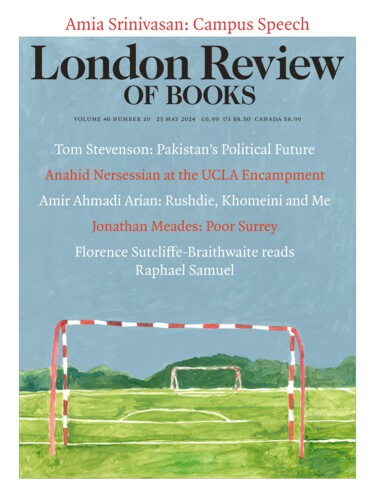Amia Srinivasan
Amia Srinivasan is the Chichele Professor of Social and Political Theory at All Souls College, Oxford and a contributing editor at the LRB. Her first book, The Right to Sex: Feminism in the 21st Century, was published in 2021. The title essay was first published in the LRB as ‘Does anyone have the right to sex?’ She’s also written for the paper on subjects including free speech on campus, pronouns, octopuses, bestiality and sharks.
The Impossible Patient: Return of the Unconscious
Amia Srinivasan, 25 December 2025
The unconscious is back. Why now? Certainly it ruptured into consciousness in the days and months following 7 October 2023, when the Israeli death machine let loose on Gaza, accelerating into a genocide of the Palestinian people that has cost Israel a measure of its international legitimacy and led to the prolonged captivity and death of hostages, increased antisemitism and an exodus of...
If We Say Yes: Campus Speech
Amia Srinivasan, 23 May 2024
An open letter is an unloved thing. Written by committee and in haste, it is a monument to compromise: a minimal statement to which all signatories can agree, or – worse – a maximal statement that no signatory fully believes. Some academics have a general policy against signing them. I discovered that was true of some of my Oxford colleagues last year, when I drafted and...
Free Speech on Campus
29 June 2023
Cancelled: Can I speak freely?
Amia Srinivasan, 29 June 2023
You can seek to eradicate such viewpoints from universities. You can also believe that universities should become no-holds-barred venues for free and open debate. But it takes a certain mental flexibility to think that the one can be a way of achieving the other.
Podcasts & Videos
Cancelled
Amia Srinivasan and Malin Hay
Amia Srinivasan discusses the UK’s recent appointment of a ‘free speech tsar’, whether students are increasingly leaning left and how activists across the political spectrum weaponise the concept...
Everyone misplaces my keys
Amia Srinivasan and Thomas Jones
Amia Srinivasan talks to Thomas Jones about the long search for a third person singular, gender-neutral pronoun, and the resurgence of the pronoun debate in recent years.
Leïla Slimani talks to Amia Srinivasan about her latest book Sex and Lies, which departs from fiction to explore the lives of and give a voice to the young women of Morocco, struggling to survive and...
Read anywhere with the London Review of Books app, available now from the App Store for Apple devices, Google Play for Android devices and Amazon for your Kindle Fire.
Sign up to our newsletter
For highlights from the latest issue, our archive and the blog, as well as news, events and exclusive promotions.



